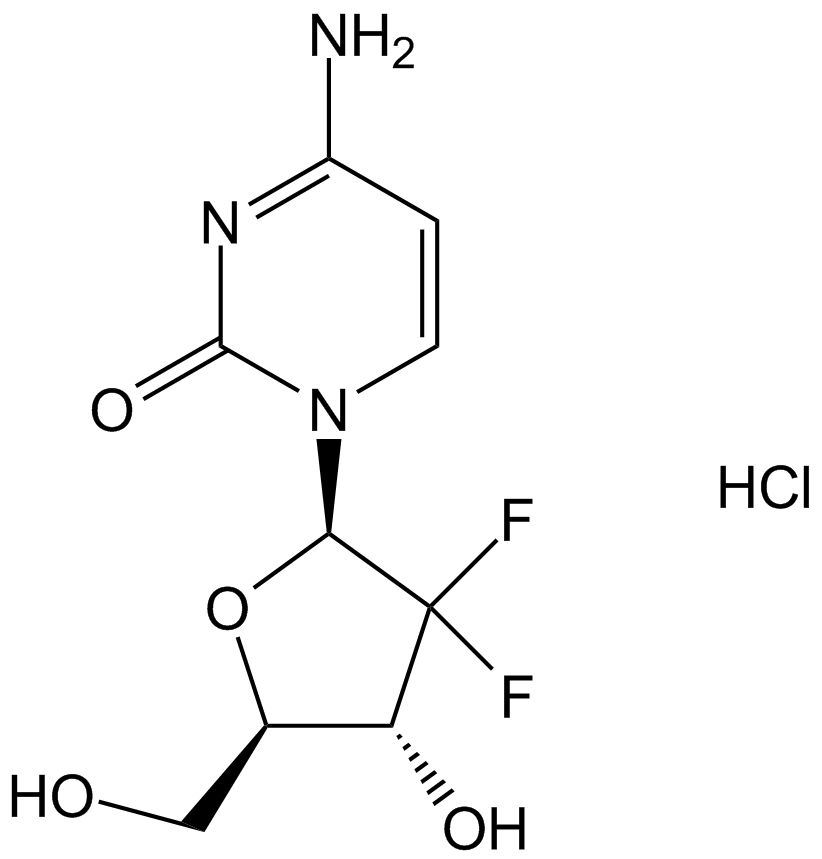Gemcitabine HCl |
| Catalog No.GC14447 |
Gemcitabine Hydrochloride (LY 188011 Hydrochloride) is a pyrimidine nucleoside analog antimetabolite and an antineoplastic agent. Gemcitabine Hydrochloride inhibits DNA synthesis and repair, resulting in autophagyand apoptosis.
Products are for research use only. Not for human use. We do not sell to patients.

Cas No.: 122111-03-9
Sample solution is provided at 25 µL, 10mM.
Gemcitabine HCl is an inhibitor of DNA synthesis with the IC50 value of 240.4±29.0 μM (CCRF-CEM/dCK−/− cells), 14.7±2.8 nM (TC-1 cells), 36.7 ± 5.1 μM (TC-1-GR cells), and 50 nM (PANC1 cells) [1].
DNA synthesis is the natural or artificial creation of DNA molecules and can be defined as DNA replication, polymerase chain reaction, and gene synthesis. It is reported that DNA synthesis process plays an important role in a variety of cancers, many drugs have been made to target this process to inhibit tumor growth or metastasis [2] [3].
Gemcitabine HCl is a DNA synthesis inhibitor. When tested with pancreatic cancer cell line COLO 357 and L3.6pl, Gemcitabine HCl treatment following genistein which sensitized cells to Gemcitabine HCL significantly inhibited cell growth and increased cell apoptosis [4]. In MIA PaCa-2 cells, Gemcitabine HCl showed markedly cytotoxicity to cells with the IC50 value of 49.7 ± 17.7 nM via inhibiting the activity of dDNA [1].
In SCID mice bearing COLO 357 cells orthotopically implanted, compared with control group, treated both genistein and gemcitabine significantly decreased (75%, P < 0.01) tumor growth and body weight [4].
References:
[1].Lansakara, P.D., B.L. Rodriguez, and Z. Cui, Synthesis and in vitro evaluation of novel lipophilic monophosphorylated gemcitabine derivatives and their nanoparticles. Int J Pharm, 2012. 429(1-2): p. 123-34.
[2].Kostyrev, O.A. and T.A. Leont'eva, [Autoradiographic study of DNA systhesis in muscle and connective tissue cells of the heart during exposure to isopropylnorepinephrine]. Biull Eksp Biol Med, 1973. 76(7): p. 108-11.
[3].Mathews, L.A., et al., Increased expression of DNA repair genes in invasive human pancreatic cancer cells. Pancreas, 2011. 40(5): p. 730-9.
[4].Banerjee, S., et al., Molecular evidence for increased antitumor activity of gemcitabine by genistein in vitro and in vivo using an orthotopic model of pancreatic cancer. Cancer Res, 2005. 65(19): p. 9064-72.
Average Rating: 5 (Based on Reviews and 37 reference(s) in Google Scholar.)
GLPBIO products are for RESEARCH USE ONLY. Please make sure your review or question is research based.
Required fields are marked with *




















